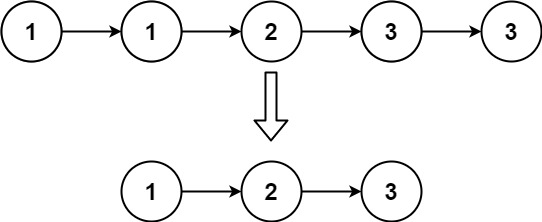83. Remove Duplicates from Sorted List
Description
Given the head of a sorted linked list, delete all duplicates such that each element appears only once. Return the linked list sorted as well.
Example 1:

- Input: head = [1,1,2]
- Output: [1,2]
Example 2:

- Input: head = [1,1,2,3,3]
- Output: [1,2,3]
Constraints:
- The number of nodes in the list is in the range
[0, 300]. - -100 <= Node.val <= 100
- The list is guaranteed to be sorted in ascending order.
Submitted Code
# Definition for singly-linked list.
# class ListNode(object):
# def __init__(self, val=0, next=None):
# self.val = val
# self.next = next
class Solution(object):
def deleteDuplicates(self, head):
"""
:type head: Optional[ListNode]
:rtype: Optional[ListNode]
"""
ans = ListNode(-101) # 더미 노드 초기값을 문제에서 설정한 범위의 밖으로 설정
cur = ans # 결과 리스트에 사용되는 포인터를 ans로 초기화
while head: # 입력 리스트 head 순회
if head.val != cur.val:
cur.next = head # head를 결과 리스트에 연결
cur = cur.next # cur을 새로 추가된 노드로 이동
head = head.next # head에서 다음 노드로 이동
cur.next = None # head의 마지막 노드 이후 연결 제거
return ans.next # 더미 노드 이후의 리스트를 반환
Runtime: 0 ms | Beats 100.00%
Memory: 12.50 MB | Beats 13.71%
ListNode() 함수로 연결 리스트를 생성하면 초기값이 자동으로 0으로 설정되어서 0 → 0 → 0 과 같은 head일 경우 아무 것도 출력되지 않았다.
그래서 -101로 더미 노드의 초기값을 설정해서 처음 시작은 무조건 중복되지 않도록 했는데, 깔끔한 알고리즘은 아닌 것 같다.
Other Solutions
1st
class Solution:
def deleteDuplicates(self, head: Optional[ListNode]) -> Optional[ListNode]:
res = head # head를 변경해도 계속 리스트 시작 부분을 추적하기 위함
while head and head.next: # head와 head.next가 None이 아닐 때까지 반복
if head.val == head.next.val: # head에서 현재 가리키는 노드와 그 다음 노드가
head.next = head.next.next # 같으면 그 다음 노드를 스킵하고 그 다음 다음의 노드를 포인트
else:
head = head.next # 같지 않으면 그 다음 노드를 포인트
return res # 변경된 연결 리스트의 헤드를 가리키는 res 반환
time complexity: 𝑂(𝑛)
space complexity: 𝑂(1)
head = 1 → 1 → 2 → 3 → 3
1 → 1 → 2 → 2 → 3 head.val(= 1) == head.next(= 1) ⇒ remove 1 h r 1 → 2 → 2 → 3 head.val(= 1) != head.next(= 2) ⇒ move h h r 1 → 2 → 2 → 3 head.val(= 2) == head.next(= 2) ⇒ remove 2 r h 1 → 2 → 3 head.val(= 2) != head.next(= 3) ⇒ move h r h 1 → 2 → 3 return res(= 1 → 2 → 3) r h
res = 1 → 2 → 3
2nd
class Solution:
def deleteDuplicates(self, head: ListNode) -> ListNode:
current = head
while current and current.next:
if current.val == current.next.val:
current.next = current.next.next # Skip the duplicate
else:
current = current.next # Move to the next node
return head
위의 예시 답안과 달리 두 개의 포인터를 따로 두지 않았다. 하지만 리스트를 변경하는 것은 current고 head가 리스트 시작점을 나타내는 포인터인 것은 변함없기 때문에 head를 반환해도 올바른 결과가 나온다.



Leave a comment